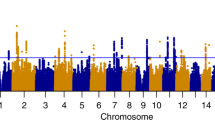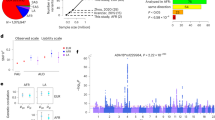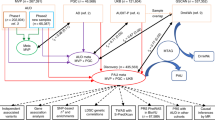Abstract
Alcohol is widely consumed; however, excessive use creates serious physical, psychological and social problems and contributes to the pathogenesis of many diseases. Alcohol use disorders (that is, alcohol dependence and alcohol abuse) are maladaptive patterns of excessive drinking that lead to serious problems. Abundant evidence indicates that alcohol dependence (alcoholism) is a complex genetic disease, with variations in a large number of genes affecting a person's risk of alcoholism. Some of these genes have been identified, including two genes involved in the metabolism of alcohol (ADH1B and ALDH2) that have the strongest known affects on the risk of alcoholism. Studies continue to reveal other genes in which variants affect the risk of alcoholism or related traits, including GABRA2, CHRM2, KCNJ6 and AUTS2. As more variants are analysed and studies are combined for meta-analysis to achieve increased sample sizes, an improved picture of the many genes and pathways that affect the risk of alcoholism will be possible.
Key Points
-
Alcohol dependence is a common, complex genetic disease, with many variants in numerous genes contributing to the risk of developing this disorder
-
Genes involved in alcohol metabolism have strong effects on risk; functional variants of ADH1B and ALDH2 exist that protect against alcoholism, with ORs of 0.2–0.4
-
Several other genes, including GABRA2 and CHRM2, have been associated with alcohol dependence in many studies; evidence suggests numerous other genes affect the disease and traits associated with it
-
As samples of increased size are assembled for meta-analyses and an extended range of alleles are tested, the roles of many additional genes will probably be uncovered
-
Excessive alcohol consumption, particularly binge drinking, contributes to many other diseases, including cirrhosis and cancers of the upper aerodigestive tract, colon, rectum and liver
-
Genes that alter how much alcohol a person consumes and how often affect the risk of many of these diseases
This is a preview of subscription content, access via your institution
Access options
Subscribe to this journal
Receive 12 print issues and online access
$209.00 per year
only $17.42 per issue
Buy this article
- Purchase on Springer Link
- Instant access to full article PDF
Prices may be subject to local taxes which are calculated during checkout

Similar content being viewed by others
References
US Department of Agriculture, US Department of Health and Human Services. Dietary Guidelines for Americans 2010 [online], (2011).
Rehm, J. et al. The relation between different dimensions of alcohol consumption and burden of disease: an overview. Addiction 105, 817–843 (2010).
World Health Organization. Global status report on alcohol and health (WHO, 2011).
Lim, S. S. et al. A comparative risk assessment of burden of disease and injury attributable to 67 risk factors and risk factor clusters in 21 regions, 1990–2010: a systematic analysis for the Global Burden of Disease Study 2010. Lancet 380, 2224–2260 (2012).
American Psychiatric Association. Diagnostic and Statistical Manual of Mental Disorders, Fourth Edition (Text Revision) (American Psychiatric Association, 2000).
Hasin, D. S., Stinson, F. S., Ogburn, E. & Grant, B. F. Prevalence, correlates, disability, and comorbidity of DSM-IV alcohol abuse and dependence in the United States: results from the National Epidemiologic Survey on Alcohol and Related Conditions. Arch. Gen. Psychiatry 64, 830–842 (2007).
Dawson, D. A., Goldstein, R. B. & Grant, B. F. Differences in the Profiles of DSM-IV and DSM-5 Alcohol Use Disorders: Implications for Clinicians. Alcohol. Clin. Exp. Res. 37 (Suppl. 1), E305–E313 (2013).
Agrawal, A., Heath, A. C. & Lynskey, M. T. DSM-IV to DSM-5: the impact of proposed revisions on diagnosis of alcohol use disorders. Addiction 106, 1935–1943 (2011).
American Psychiatric Association. Diagnostic and Statistical Manual of Mental Disorders: DSM-5 (American Psychiatric Publishing, 2013).
Mewton, L., Slade, T., McBride, O., Grove, R. & Teesson, M. An evaluation of the proposed DSM-5 alcohol use disorder criteria using Australian national data. Addiction 106, 941–950 (2011).
Heath, A. C. et al. Genetic and environmental contributions to alcohol dependence risk in a national twin sample: consistency of findings in women and men. Psychol. Med. 27, 1381–1396 (1997).
Goodwin, D. W. The cause of alcoholism and why it runs in families. Br. J. Addict. Alcohol Other Drugs 74, 161–164 (1979).
Heath, A. C. Genetic influences on alcoholism risk: a review of adoption and twin studies. Alc. Health. Res. World 19, 166–171 (1995).
Sigvardsson, S., Bohman, M. & Cloninger, C. R. Replication of the Stockholm Adoption Study of alcoholism. Confirmatory cross-fostering analysis. Arch. Gen. Psychiatry 53, 681–687 (1996).
Cloninger, C. R., Bohman, M. & Sigvardsson, S. Inheritance of alcohol abuse: Cross-fostering analysis of adopted men. Arch. Gen. Psychiatry 38, 861–868 (1981).
Bohman, M., Sigvardsson, S. & Cloninger, C. R. Maternal inheritance of alcohol abuse. Cross-fostering analysis of adopted women. Arch. Gen. Psychiatry 38, 965–969 (1981).
Prescott, C. A. & Kendler, K. S. Genetic and environmental contributions to alcohol abuse and dependence in a population-based sample of male twins. Am. J. Psychiatry 156, 34–40 (1999).
Kendler, K. S., Neale, M. C., Heath, A. C., Kessler, R. C. & Eaves, L. J. A twin-family study of alcoholism in women. Am. J. Psychiatry 151, 707–715 (1994).
Pickens, R. W. et al. Heterogeneity in the inheritance of alcoholism: a study of male and female twins. Arch. Gen. Psychiatry 48, 19–28 (1991).
McBride, W. J. & Li, T. K. Animal models of alcoholism: neurobiology of high alcohol-drinking behavior in rodents. Crit. Rev. Neurobiol. 12, 339–369 (1998).
Foroud, T., Edenberg, H. J. & Crabbe, J. C. Genetic research: who is at risk for alcoholism? Alcohol Res. Health 33, 64–75 (2010).
Hurley, T. D. & Edenberg, H. J. Genes encoding enzymes involved in ethanol metabolism. Alcohol Res. 34, 339–344 (2012).
Li, D., Zhao, H. & Gelernter, J. Strong protective effect of the aldehyde dehydrogenase gene (ALDH2) 504lys (*2) allele against alcoholism and alcohol-induced medical diseases in Asians. Hum. Genet. 131, 725–737 (2012).
Oota, H. et al. The evolution and population genetics of the ALDH2 locus: random genetic drift, selection, and low levels of recombination. Ann. Hum. Genet. 68, 93–109 (2004).
Luczak, S. E., Glatt, S. J. & Wall, T. J. Meta-analyses of ALDH2 and ADH1B with alcohol dependence in Asians. Psychol. Bull. 132, 607–621 (2006).
Larson, H. N., Weiner, H. & Hurley, T. D. Disruption of the coenzyme binding site and dimer interface revealed in the crystal structure of mitochondrial aldehyde dehydrogenase “Asian” variant. J. Biol. Chem. 280, 30550–30556 (2005).
Crabb, D. W., Edenberg, H. J., Bosron, W. F. & Li, T. K. Genotypes for aldehyde dehydrogenase deficiency and alcohol sensitivity. The inactive ALDH2(2) allele is dominant. J. Clin. Invest. 83, 314–316 (1989).
Thomasson, H. R. et al. Alcohol and aldehyde dehydrogenase genotypes and alcoholism in Chinese men. Am. J. Hum. Genet. 48, 677–681 (1991).
Eng, M. Y., Luczak, S. E. & Wall, T. L. ALDH2, ADH1B, and ADH1C genotypes in Asians: a literature review. Alcohol Res. Health 30, 22–27 (2007).
Higuchi, S. Polymorphisms of ethanol metabolizing enzyme genes and alcoholism. Alcohol Alcohol. Suppl. 2, 29–34 (1994).
Edenberg, H. J. & Bosron, W. F. in Comprehensive Toxicology (ed. McQueen, C. A.) 111–130 (Academic Press, 2010).
Yokoyama, A. et al. Contribution of the alcohol dehydrogenase-1B genotype and oral microorganisms to high salivary acetaldehyde concentrations in Japanese alcoholic men. Int. J. Cancer 121, 1047–1054 (2007).
Chen, C.-C. et al. Interaction between the functional polymorphisms of the alcohol-metabolism genes in protection against alcoholism. Am. J. Hum. Genet. 65, 795–807 (1999).
Bierut, L. J. et al. ADH1B is associated with alcohol dependence and alcohol consumption in populations of European and African ancestry. Mol. Psychiatry 17, 445–50 (2012).
Whitfield, J. B. Alcohol dehydrogenase and alcohol dependence: variation in genotype-associated risk between populations. Am. J. Hum. Genet. 71, 1247–1250 (2002).
Osier, M. V. et al. ALFRED: An allele frequency database for anthropology. Am. J. Phys. Anthropol. 119, 77–83 (2002).
Li, H. et al. Geographically separate increases in the frequency of the derived ADH1B*47His allele in eastern and western Asia. Am. J. Hum. Genet. 81, 842–846 (2007).
Osier, M. V. et al. A global perspective on genetic variation at the ADH genes reveals unusual patterns of linkage disequilibrium and diversity. Am. J. Hum. Genet. 71, 84–99 (2002).
Edenberg, H. J. et al. Association of alcohol dehydrogenase genes with alcohol dependence: a comprehensive analysis. Hum. Mol. Genet. 15, 1539–1549 (2006).
Kuo, P. H. et al. Association of ADH and ALDH genes with alcohol dependence in the Irish Affected Sib Pair Study of alcohol dependence (IASPSAD) sample. Alcohol. Clin. Exp. Res. 32, 785–795 (2008).
Luo, X. et al. Multiple ADH genes modulate risk for drug dependence in both African- and European-Americans. Hum. Mol. Genet. 16, 380–390 (2007).
Reich, T. et al. Genome-wide search for genes affecting the risk for alcohol dependence. Am. J. Med. Genet. 81, 207–215 (1998).
Long, J. C. et al. Evidence for genetic linkage to alcohol dependence on chromosomes 4 and 11 from and autosome-wide scan in an American Indian population. Am. J. Med. Genet. 81, 216–221 (1998).
Edenberg, H. J. et al. Variations in GABRA2, encoding the α 2 subunit of the GABA(A) receptor, are associated with alcohol dependence and with brain oscillations. Am. J. Hum. Genet. 74, 705–714 (2004).
Covault, J., Gelernter, J., Hesselbrock, V., Nellissery, M. & Kranzler, H. R. Allelic and haplotypic association of GABRA2 with alcohol dependence. Am. J. Med. Genet. B Neuropsychiatr. Genet. 129, 104–109 (2004).
Fehr, C. et al. Confirmation of association of the GABRA2 gene with alcohol dependence by subtype-specific analysis. Psychiatr. Genet. 16, 9–17 (2006).
Lappalainen, J. et al. Association between alcoholism and gamma-amino butyric acid alpha2 receptor subtype in a Russian population. Alcohol. Clin. Exp. Res. 29, 493–498 (2005).
Villafuerte, S. et al. Impulsiveness and insula activation during reward anticipation are associated with genetic variants in GABRA2 in a family sample enriched for alcoholism. Mol. Psychiatry 17, 511–519 (2012).
Ittiwut, C. et al. GABRG1 and GABRA2 variation associated with alcohol dependence in African Americans. Alcohol. Clin. Exp. Res. 36, 588–593 (2012).
Covault, J., Gelernter, J., Jensen, K., Anton, R. & Kranzler, H. R. Markers in the 5′-region of GABRG1 associate to alcohol dependence and are in linkage disequilibrium with markers in the adjacent GABRA2 gene. Neuropsychopharmacology 33, 837–848 (2008).
Enoch, M. A. et al. GABRG1 and GABRA2 as independent predictors for alcoholism in two populations. Neuropsychopharmacology 34, 1245–1254 (2009).
Luo, X. et al. CHRM2 gene predisposes to alcohol dependence, drug dependence and affective disorders: results from an extended case–control structured association study. Hum. Mol. Genet. 14, 2421–2434 (2005).
Agrawal, A. et al. Association of GABRA2 with drug dependence in the collaborative study of the genetics of alcoholism sample. Behav. Genet. 36, 640–650 (2006).
Costa, L. & Bauer, L. Quantitative electroencephalographic differences associated with alcohol, cocaine, heroin and dual-substance dependence. Drug Alcohol Depend. 46, 87–93 (1997).
Rangaswamy, M. et al. Beta power in the EEG of alcoholics. Biol. Psychiatry 52, 831–842 (2002).
Rangaswamy, M. et al. Resting EEG in offspring of male alcoholics: beta frequencies. Int. J. Psychophysiol. 51, 239–251 (2004).
Bauer, L. O. & Hesselbrock, V. EEG, autonomic, and subjective correlates of the risk for alcoholism. J. Stud. Alcohol 54, 577–589 (1993).
Porjesz, B. et al. Linkage disequilibrium between the beta frequency of the human EEG and a GABAA receptor gene locus. Proc. Natl Acad. Sci. USA 99, 3729–3733 (2002).
Ghosh, S. et al. Linkage mapping of β2 EEG waves via non-parametric regression. Am. J. Med. Genet. 118B, 166–1671 (2003).
Lydall, G. J. et al. Genetic association study of GABRA2 single nucleotide polymorphisms and electroencephalography in alcohol dependence. Neurosci. Lett. 500, 162–166 (2011).
Wang, J. C. et al. Evidence of common and specific genetic effects: association of the muscarinic acetylcholine receptor M2 (CHRM2) gene with alcohol dependence and major depressive syndrome. Hum. Mol. Genet. 13, 1903–1911 (2004).
Dick, D. M. et al. Alcohol dependence with comorbid drug dependence: genetic and phenotypic associations suggest a more severe form of the disorder with stronger genetic contribution to risk. Addiction 102, 1131–1139 (2007).
Jones, K. A. et al. A cholinergic receptor gene (CHRM2) affects event-related oscillations. Behav. Genet. 36, 627–639 (2006).
Jones, K. A. et al. Linkage and linkage disequilibrium of evoked EEG oscillations with CHRM2 receptor gene polymorphisms: implications for human brain dynamics and cognition. Int. J. Psychophysiol. 53, 75–90 (2004).
Rietschel, M. & Treutlein, J. The genetics of alcohol dependence. Ann. NY Acad. Sci. 1282, 39–70 (2013).
Treutlein, J. et al. Genome-wide association study of alcohol dependence. Arch. Gen. Psychiatry 66, 773–784 (2009).
Hill, S. Y. et al. A genome wide search for alcoholism susceptibility genes. Am. J. Med. Genet. B Neuropsychiatr. Genet. 128B, 102–113 (2004).
Nurnberger, J. I. Jr et al. Evidence for a locus on chromosome 1 that influences vulnerability to alcoholism and affective disorder. Am. J. Psychiatry 158, 718–724 (2001).
Schuckit, M. A. et al. A genome-wide search for genes that relate to a low level of response to alcohol. Alcohol. Clin. Exp. Res. 25, 323–329 (2001).
Begleiter, H. et al. Quantitative trait loci analysis of human event-related brain potentials: P3 voltage. Electroencephalogr. Clin. Neurophysiol. 108, 244–250 (1998).
Porjesz, B. et al. Linkage and linkage disequilibrium mapping of ERP and EEG phenotypes. Biol. Psychol. 61, 229–248 (2002).
Kang, S. J. et al. Family-based genome-wide association study of frontal theta oscillations identifies potassium channel gene KCNJ6. Genes Brain Behav. 11, 712–719 (2012).
Luscher, C., Jan, L. Y., Stoffel, M., Malenka, R. C. & Nicoll, R. A. G protein-coupled inwardly rectifying K+ channels (GIRKs) mediate postsynaptic but not presynaptic transmitter actions in hippocampal neurons. Neuron 19, 687–695 (1997).
Blednov, Y. A., Stoffel, M., Chang, S. R. & Harris, R. A. Potassium channels as targets for ethanol: studies of G-protein-coupled inwardly rectifying potassium channel 2 (GIRK2) null mutant mice. J. Pharmacol. Exp. Ther. 298, 521–530 (2001).
Lotsch, J., Pruss, H., Veh, R. W. & Doehring, A. A KCNJ6 (Kir3.2, GIRK2) gene polymorphism modulates opioid effects on analgesia and addiction but not on pupil size. Pharmacogenet. Genomics 20, 291–297 (2010).
Ikeda, K. et al. Molecular mechanisms of analgesia induced by opioids and ethanol: isthe GIRK channel one of the keys? Neurosci. Res. 44, 121–131 (2002).
Schumann, G. et al. Genome-wide association and genetic functional studies identify autism susceptibility candidate 2 gene (AUTS2) in the regulation of alcohol consumption. Proc. Natl Acad. Sci. USA 108, 7119–7124 (2011).
Chen, Y.-H., Liao, D.-L., Lai, C.-H. & Chen, C.-H. Genetic analysis of AUTS2 as a susceptibility gene of heroin dependence. Drug Alcohol Depend. 128, 238–242 (2013).
Zuo, L. et al. Genome-wide significant association signals in IPO11-HTR1A region specific for alcohol and nicotine codependence. Alcohol. Clin. Exp. Res. 37, 730–739 (2013).
Overstreet, D. H., Knapp, D. J., Moy, S. S. & Breese, G. R. A 5-HT1A agonist and a 5-HT2c antagonist reduce social interaction deficit induced by multiple ethanol withdrawals in rats. Psychopharmacology (Berl.) 167, 344–352 (2003).
Lewis, S. J. & Smith, G. D. Alcohol, ALDH2, and esophageal cancer: a meta-analysis which illustrates the potentials and limitations of a Mendelian randomization approach. Cancer Epidemiol. Biomarkers Prev. 14, 1967–1971 (2005).
Gupta, S., Wang, F., Holly, E. A. & Bracci, P. M. Risk of pancreatic cancer by alcohol dose, duration, and pattern of consumption, including binge drinking: a population-based study. Cancer Causes Control 21, 1047–1059 (2010).
Yokoyama, A. et al. Esophageal squamous cell carcinoma and aldehyde dehydrogenase-2 genotypes in Japanese females. Alcohol. Clin. Exp. Res. 30, 491–500 (2006).
Yokoyama, A. et al. Genetic polymorphisms of alcohol and aldehyde dehydrogenases and glutathione S-transferase M1 and drinking, smoking, and diet in Japanese men with esophageal squamous cell carcinoma. Carcinogenesis 23, 1851–1859 (2002).
Seitz, H. K. & Meier, P. The role of acetaldehyde in upper digestive tract cancer in alcoholics. Transl Med. 149, 293–297 (2007).
Seitz, H. K. & Homann, N. The role of acetaldehyde in alcohol-associated cancer of the gastrointestinal tract. Novartis Found. Symp. 285, 110–119 (2007).
Seitz, H. K. & Becker, P. Alcohol metabolism and cancer risk. Alcohol Res. Health 30, 38–41 (2007).
Ruidavets, J. B. et al. Patterns of alcohol consumption and ischaemic heart disease in culturally divergent countries: the Prospective Epidemiological Study of Myocardial Infarction (PRIME). BMJ 341, c6077 (2010).
Graff-Iversen, S. et al. Divergent associations of drinking frequency and binge consumption of alcohol with mortality within the same cohort. J. Epidemiol. Community Health 67, 350–357 (2012).
Acknowledgements
Related work in the authors' laboratories is supported by grants from the National Institutes of Health, AA008401, AA006460, AA020892, AA007611.
Author information
Authors and Affiliations
Contributions
Both authors contributed equally to all aspects of this article.
Corresponding author
Ethics declarations
Competing interests
The authors declare no competing financial interests.
Rights and permissions
About this article
Cite this article
Edenberg, H., Foroud, T. Genetics and alcoholism. Nat Rev Gastroenterol Hepatol 10, 487–494 (2013). https://doi.org/10.1038/nrgastro.2013.86
Published:
Issue Date:
DOI: https://doi.org/10.1038/nrgastro.2013.86
This article is cited by
-
The alcohol flushing response is associated with the risk of depression
Scientific Reports (2022)
-
Yohimbine as a pharmacological probe for alcohol research: a systematic review of rodent and human studies
Neuropsychopharmacology (2022)
-
Association of ADH1B polymorphism and alcohol consumption with increased risk of intracerebral hemorrhagic stroke
Journal of Translational Medicine (2021)
-
Synthetic curcumin analog: inhibiting the invasion, angiogenesis, and metastasis in human laryngeal carcinoma cells via NF-kB pathway
Molecular Biology Reports (2021)
-
Allele-specific expression and high-throughput reporter assay reveal functional genetic variants associated with alcohol use disorders
Molecular Psychiatry (2021)



